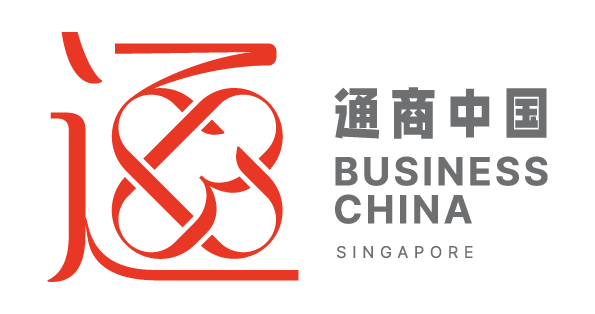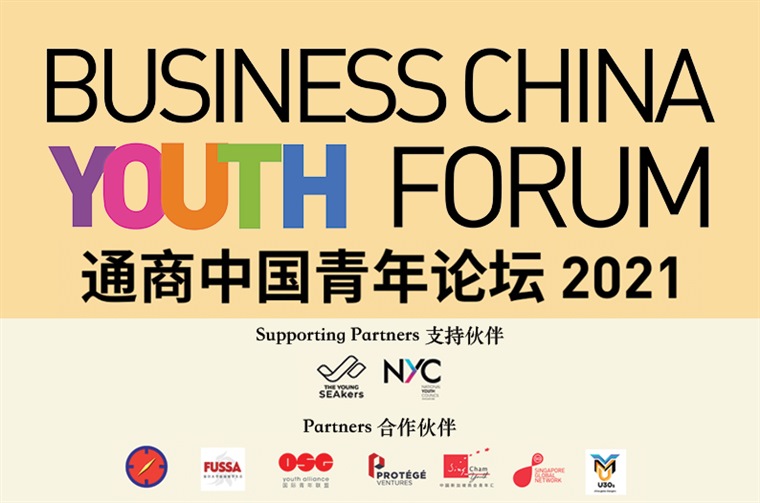Singapore, 12 July 2021 – The third Business China Youth Forum (BCYF), organised in tandem with the FutureChina Global Forum (FCGF), was successfully held virtually on 12 July 2021. This year, the forum’s theme was “Generation Never Normal: Youths as Drivers of Future ASEAN-China Growth”.
The term “Never Normal” encapsulates the volatile and unpredictable circumstances of our times. It also reflects the proximity of youths to changing digital and consumerism trends and their willingness to engage in entrepreneurial adventures.
Mr Chee Hong Tat, Senior Minister of State, Ministry of Transport, graced the forum as the Guest-of-Honour and marked the opening speech. He shared the opportunities and challenges in the region. He highlighted that youths can play an important role to strengthen and deepen the links between ASEAN and China, focusing on the economy, technology and people-to-people relationships.
Close to 300 participants attended the BCYF, with English-Chinese simultaneous interpretation options provided for the participants. Three discussion panels were convened to allow participants to gain a deeper understanding about youth-driven ASEAN-China growth in relation to digital consumerism, investment trends, and entrepreneurship.
Youths as Setters of Paradigms in the Post-pandemic World
Youths are setting new norms and paradigms despite the challenges presented by COVID-19. This is visible in many industries. For one, our first panel concurred that youth consumers are revolutionising marketing and the way consumers make purchasing decisions – across the ASEAN-China region. Digitally savvy youths are now turning to Key Opinion Leaders (KOLs) and celebrities to obtain information online in pursuit of better product experiences and psychological satisfaction, fundamentally altering the way information is conveyed to consumers from businesses.
Mr Benjamin Cavender, Managing Director of China Market Research Group (CMR), explained, “… when the consumer purchases now, they are not thinking about the direct relationship with the brand anymore. They are thinking about the relationship with digital personalities they are connected to.”
This phenomenon was acknowledged by industry players such as panellists Mr Rui Zaojie, Partner at Tisiwi Ventures, Mr Melvyn Goh, CEO of M Media Ventures and founder of U30s China, and Mr Joseph Liu, founder and CEO of SCI Ecommerce. They also highlighted that in response to the competitive environment, firms now pivot their business philosophies to provide services and champion social causes, establishing brand names that align with the values of youth consumers. This reflects another stark difference of doing business from the past.
Aside from creating new energies in the consumerism space, the forum’s Guest-of-Honour Senior Minister of State for Transport Mr Chee Hong Tat, also shared that youths are playing a prominent role in maintaining a prosperous and stable regional landscape. The formation of new friendships and ties in the region from youths’ engagement in multilateral youth exchanges and internships such as the Singapore-China Youth Interns Exchange Scheme (YES) will spark more opportunities in the region.
Achieving Personal Growth Amidst the “Never Normal”
Amid COVID-19 disruptions, youths face anxiety and perplexity of what lies ahead for them. Keynote speaker, Mr Nicholas Tan, Partner of East Ocean Capital and CFO at Ace Global, shared his experience working in MNCs and his venture into the China market. He suggested that youths can anchor themselves by obtaining basic training in a field while trying as many internships as possible to gain experience. This advice was further reinforced by panellists in Panel 3. Mr Tan also advised youths to pursue opportunities related to one’s strengths, rather than just eyeing common market opportunities.
Similarly, to manage anxiety, Ms Pang Ying, “I CAN I BB” Debater and Project Lead at Boston Consulting Group Singapore, raised the point on how she kept “a parallel world” from work, of which participating in debate-related activities form an important part and much of her free time. This has allowed her to remain confident despite challenges at work, and she has also discovered more possibilities of how different aspects of life can converge. She encouraged youths to be involved in other alternatives to enhance one’s imagination and innovation.
In the third panel curated by The Young SEAkers, the discussion on entrepreneurship was robust with panellists sharing their personal journeys in self-discovery (working vs. entrepreneurship) as well as diverse insights that ranged from the importance of product-market fit and learning from role models, to the establishment of suitable company culture.
Mr Abraham Viktor, CEO of Hangry, mentioned looking beyond the short-term matrices and focusing on long-term indicators such as the company culture in order to qualify the definition of success. Ms Claire Huang, founder of Crafata and former CEO of Nimo TV Thailand, further expanded on this point, sharing her personal experiences working in a team of predominantly Thai makeup and the need to forge a spirit of healthy competition in companies. Ms Jennifer Zhang, CEO of DancingMind, also pointed out that celebrating of wins rather than focusing on losses contributes to the creation of a healthy workplace culture. In addition, Ms Zhang talked about her observations regarding the differing priorities between the early-stage and growth-stage startups, and the crucial aspect of networking with people of different managerial levels.
Future ASEAN-China Growth Outlook – Opportunities and Challenges
How would the economic outlook for ASEAN-China be in a post-pandemic world? What are some of the burgeoning investing opportunities and challenges that youths can seize in the post-COVID world? These were some of the questions our panellists touched upon in our second panel, whilst also providing advice regarding the development and networking opportunities for youth investors.
Mr Gavin Chia, Managing Director of Futu Singapore Pte Ltd, mentioned providing an enriching Moomoo community to help investors connect with each other. Similarly, Ms Tiffany Liu shared more about intercollegiate and collegiate investing communities such as the Gen Z Group she co-founded and her experience at Oxford University. They also talked about the short and long-term prospects of popular investment options amongst youths in areas such as Environmental, Social, and Governance (ESG), blockchain, and cryptocurrency. ‘Meme stocks’, in particular, was also a key subject of interest amongst the panellists.
In concluding the discussions on the topic, panellists were asked some advice they would give to youth investors. Mr Yongky Oktavianto, Vice President of Investcorp, emphasised his belief in the value of long-term investments. Mr Tony Gao, founder of Easy Transfer, concurred with Mr Oktavianto’s advice. He also urged youths to focus on long-term value and to make their own judgements on following investment trends.
Networking and Co-creation of Solutions
Ms Tin Pei Ling, CEO of Business China, concluded BCYF 2021 by delivering the closing address in both English and Mandarin. In ending the forum on a hopeful note, Ms Tin said, “After today’s Youth Forum, I hope our participants will continue to use our platform to engage each other, establish useful networks, build contacts, and perhaps, co-create solutions to the most pressing issues we have discussed today.”
Business China Youth Forum (BCYF) has been organised in tandem with the FutureChina Global Forum (FCGF) since 2019 by youth members. With support from Business China, the forum aims to bring together youths in the ASEAN-China region, to discuss in-depth critical issues and trends which are of interest to youths, and to provide the latest updates on exciting developments in China. The Organising Committee of Business China Youth Forum 2021 composed of members from the Business China Youth Chapter (BCYC).
Business China and Business China Youth Chapter would like to extend our sincere appreciation for all the hard work and dedication provided by the following partners and individuals.
Supporting partners:
The Young SEAkers (TYS)
National Youth Council (NYC)
Moderators:
Ms Sophia Huang, Vice-President of Business China Youth Chapter
Mr Nicholas Eng, Director at Globalcorp Capital
Ms Lee Zi Xin, Co-Founder of The Young SEAkers
Emcees:
Ms Shi Jiayin, a journalism undergraduate at Fudan University
Mr Zane Chong, a law undergraduate at the National University of Singapore
About Business China Youth Chapter
BCYC is a voluntary group of youths that envisions to be the leading Singapore-based community that inspires youths to be China-savvy and facilitate their connections with China. Supported by Business China, BCYC has a vibrant calendar of activities which serve the needs of the BCYC community.
To join Business China Youth Chapter, please download the application form and email to: bcyc@businesschina.org.sg.
This article is contributed by BCYC members, Ernest Tan and Tek Kai Zhen with edits by Business China.

